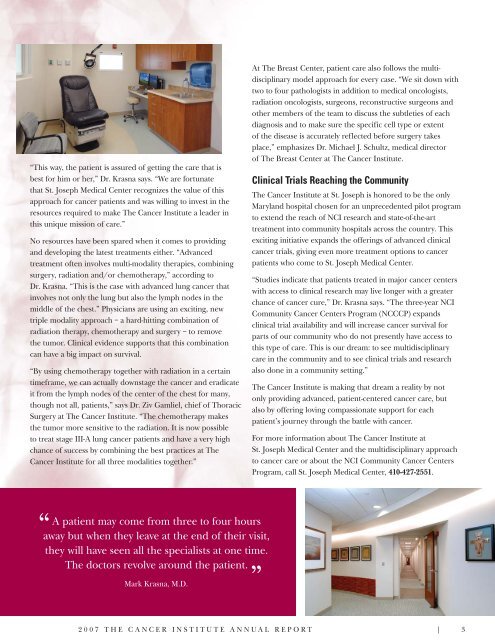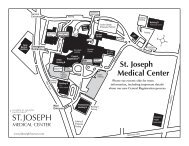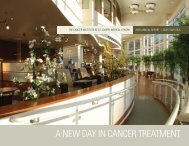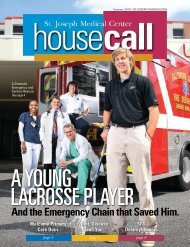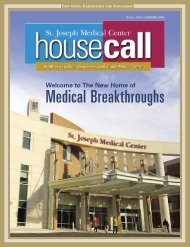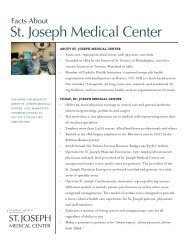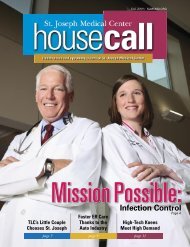2007 Cancer Annual_prod5 - St. Joseph Medical Center
2007 Cancer Annual_prod5 - St. Joseph Medical Center
2007 Cancer Annual_prod5 - St. Joseph Medical Center
You also want an ePaper? Increase the reach of your titles
YUMPU automatically turns print PDFs into web optimized ePapers that Google loves.
“This way, the patient is assured of getting the care that is<br />
best for him or her,” Dr. Krasna says. “We are fortunate<br />
that <strong>St</strong>. <strong>Joseph</strong> <strong>Medical</strong> <strong>Center</strong> recognizes the value of this<br />
approach for cancer patients and was willing to invest in the<br />
resources required to make The <strong>Cancer</strong> Institute a leader in<br />
this unique mission of care.”<br />
No resources have been spared when it comes to providing<br />
and developing the latest treatments either. “Advanced<br />
treatment often involves multi-modality therapies, combining<br />
surgery, radiation and/or chemotherapy,” according to<br />
Dr. Krasna. “This is the case with advanced lung cancer that<br />
involves not only the lung but also the lymph nodes in the<br />
middle of the chest.” Physicians are using an exciting, new<br />
triple modality approach – a hard-hitting combination of<br />
radiation therapy, chemotherapy and surgery – to remove<br />
the tumor. Clinical evidence supports that this combination<br />
can have a big impact on survival.<br />
“By using chemotherapy together with radiation in a certain<br />
timeframe, we can actually downstage the cancer and eradicate<br />
it from the lymph nodes of the center of the chest for many,<br />
though not all, patients,” says Dr. Ziv Gamliel, chief of Thoracic<br />
Surgery at The <strong>Cancer</strong> Institute. “The chemotherapy makes<br />
the tumor more sensitive to the radiation. It is now possible<br />
to treat stage III-A lung cancer patients and have a very high<br />
chance of success by combining the best practices at The<br />
<strong>Cancer</strong> Institute for all three modalities together.”<br />
At The Breast <strong>Center</strong>, patient care also follows the multidisciplinary<br />
model approach for every case. “We sit down with<br />
two to four pathologists in addition to medical oncologists,<br />
radiation oncologists, surgeons, reconstructive surgeons and<br />
other members of the team to discuss the subtleties of each<br />
diagnosis and to make sure the specific cell type or extent<br />
of the disease is accurately reflected before surgery takes<br />
place,” emphasizes Dr. Michael J. Schultz, medical director<br />
of The Breast <strong>Center</strong> at The <strong>Cancer</strong> Institute.<br />
Clinical Trials Reaching the Community<br />
The <strong>Cancer</strong> Institute at <strong>St</strong>. <strong>Joseph</strong> is honored to be the only<br />
Maryland hospital chosen for an unprecedented pilot program<br />
to extend the reach of NCI research and state-of-the-art<br />
treatment into community hospitals across the country. This<br />
exciting initiative expands the offerings of advanced clinical<br />
cancer trials, giving even more treatment options to cancer<br />
patients who come to <strong>St</strong>. <strong>Joseph</strong> <strong>Medical</strong> <strong>Center</strong>.<br />
“<strong>St</strong>udies indicate that patients treated in major cancer centers<br />
with access to clinical research may live longer with a greater<br />
chance of cancer cure,” Dr. Krasna says. “The three-year NCI<br />
Community <strong>Cancer</strong> <strong>Center</strong>s Program (NCCCP) expands<br />
clinical trial availability and will increase cancer survival for<br />
parts of our community who do not presently have access to<br />
this type of care. This is our dream: to see multidisciplinary<br />
care in the community and to see clinical trials and research<br />
also done in a community setting.”<br />
The <strong>Cancer</strong> Institute is making that dream a reality by not<br />
only providing advanced, patient-centered cancer care, but<br />
also by offering loving compassionate support for each<br />
patient’s journey through the battle with cancer.<br />
For more information about The <strong>Cancer</strong> Institute at<br />
<strong>St</strong>. <strong>Joseph</strong> <strong>Medical</strong> <strong>Center</strong> and the multidisciplinary approach<br />
to cancer care or about the NCI Community <strong>Cancer</strong> <strong>Center</strong>s<br />
Program, call <strong>St</strong>. <strong>Joseph</strong> <strong>Medical</strong> <strong>Center</strong>, 410-427-2551.<br />
“<br />
A patient may come from three to four hours<br />
away but when they leave at the end of their visit,<br />
they will have seen all the specialists at one time.<br />
The doctors revolve around the patient.<br />
Mark Krasna, M.D.<br />
“<br />
<strong>2007</strong> THE CANCER INSTITUTE ANNUAL REPORT | 3


